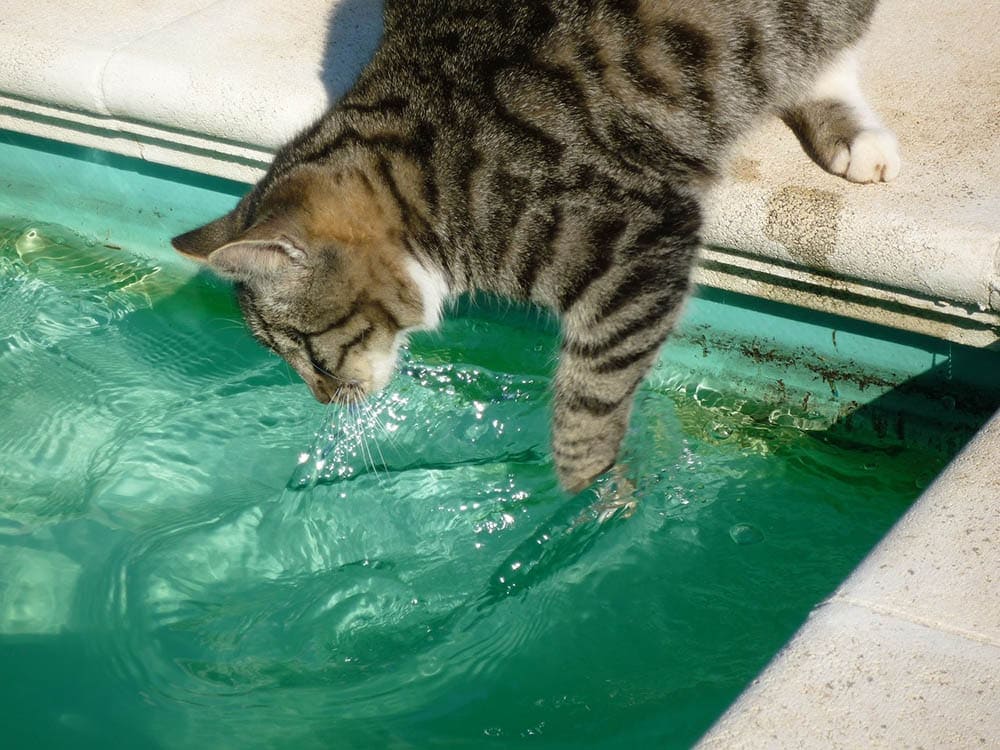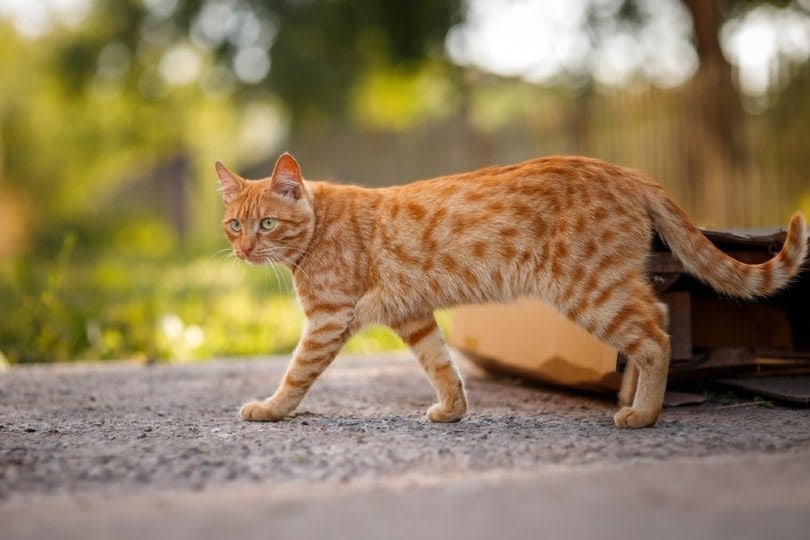Are Sunflowers Toxic to Cats? Vet-Approved Facts
Updated on
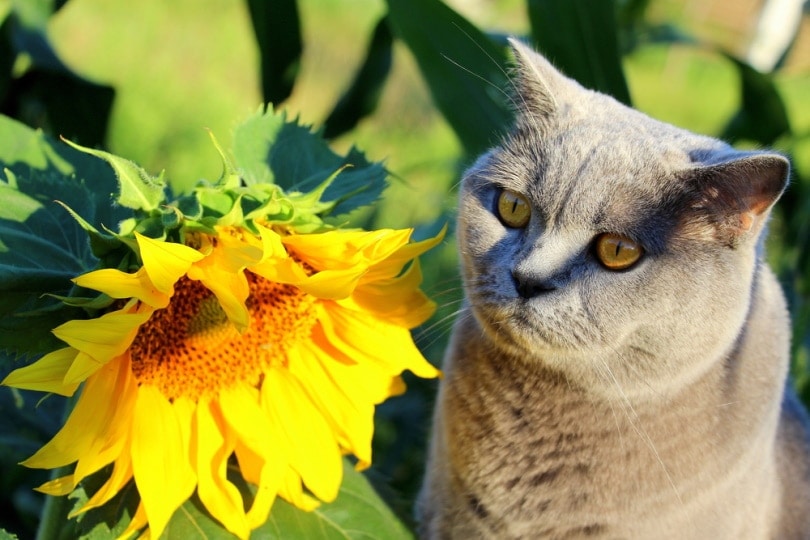
Click to Skip Ahead
The good news is that sunflowers are not toxic to cats. But your cat might experience some digestive issues if they nibble on them.
We go into more detail about the sunflower here and what might happen if your cat eats some of its leaves or petals.
A Little About the Sunflower
Sunflowers are grown naturally in North America and were initially cultivated by First Nations people for a wide variety of uses: medicinal, food, cosmetics, and the plant itself for building material.1 You can find sunflowers all over North America and Europe; they are pretty much grown around the world.
They are heliotropic flowers, which means they follow the sun as it moves across the sky from the east to the west. Even at night, the flower repositions itself toward the east in time to meet the sun in the morning.
Of course, in addition to their sunny beauty, sunflowers are famous for their seeds and oil. Both are known to be healthy additions to the human diet.
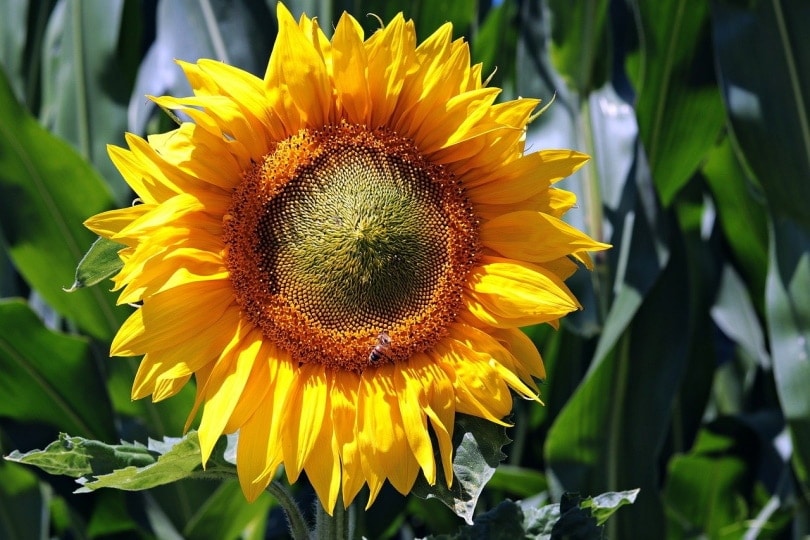
Sunflowers and Cats
The ASPCA has sunflowers listed as non-toxic for cats, dogs, and horses.2 This is good news if you have sunflowers in your garden or home! Essentially, if your cat nibbles on some petals or leaves, nothing terrible will happen.
Having said that, vets warn that some cats might end up with an upset stomach after eating sunflowers. Cats are obligate carnivores, which means that a very high proportion of their diet needs to be made up of meat, and plant matter is something they just don’t need.3
Too much vegetation and plant matter in your cat’s diet can lead to digestive issues, including nausea, vomiting, and diarrhea. Obviously, the more sunflowers your cat eats, the worse the digestive issues will get.
How About Sunflower Seeds?

Most sunflower seeds tend to be salted, which is a huge no-no for cats. The Pet Poison Helpline considers salt to be potentially toxic for cats. The most common sources of salt poisoning are attempts to induce vomiting at home and the ingestion of homemade play dough. Salt poisoning can lead to some of the following issues:
- Decreased appetite
- Vomiting
- Diarrhea
- Incoordination
- Lethargy
- Excessive urination and thirst
- Coma
- Tremors
- Seizures
If your cat has eaten anything with extra salt and exhibits any or some of these signs, bring your cat to the veterinarian immediately. You should also avoid the shells, as they can be sharp and might prove dangerous for your cat in addition to the salt.
So, if the sunflower seeds are unsalted, unseasoned, and without the shell, a few will be fine if your cat happens to eat some. The good news is that most cats aren’t particularly interested in eating sunflower seeds, so it’s something you don’t generally have to worry about.
And Sunflower Oil?
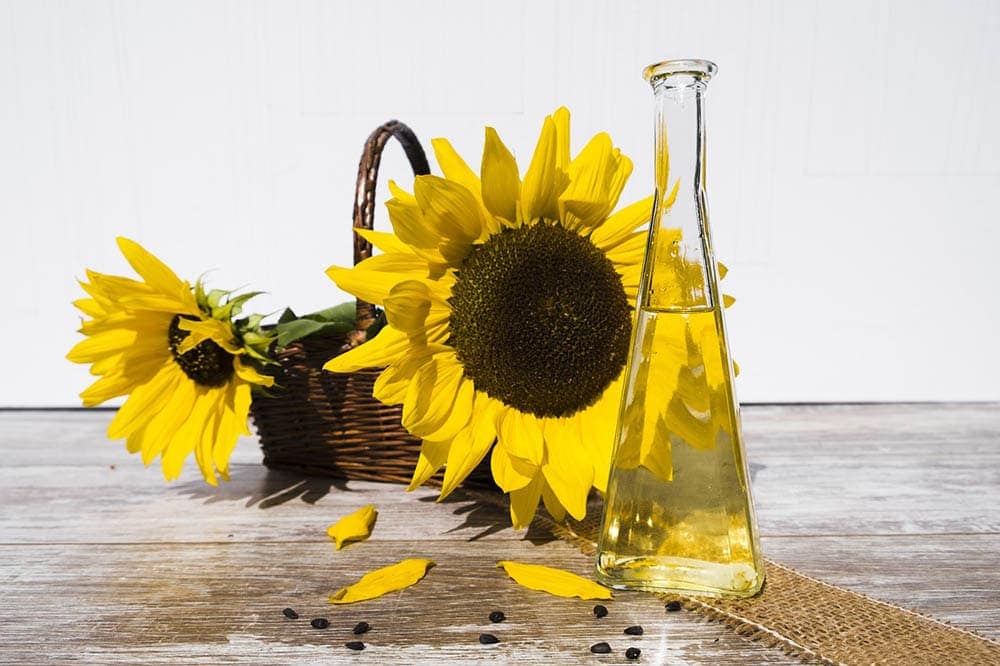
Sunflower oil is usually pretty safe for cats but only in that it’s not toxic. However, excess oil, of course, means excess fat, which can cause some digestive upset and diarrhea if consumed sporadically. When too much sunflower oil is consumed regularly, it can lead to weight gain and obesity for your cat. If your cat happens to lap up some sunflower oil, it’s absolutely fine.
It’s just something that you shouldn’t give to your cat on a regular basis if they are already fed a complete and balanced diet.
Other Flowers That Are Safe for Cats
If you’re wondering what other flowers are safe to be around your cat, you can bring any of these to your home:
While these flowers are all non-toxic for cats, like with the sunflowers, there’s always the risk of some stomach upset if your cat ingests any. You just don’t have to worry about your cat being poisoned by these flowers.
Common Flowers You Should Keep Away From Cats
The following are all flowers considered quite toxic for cats, some even deadly, and should always be kept away from them. Signs can range from serious stomach upset to kidney failure and death.
- Autumn Crocus (Colchicum autumnale): This plant is very toxic and can lead to severe digestive problems, including bloody vomiting and diarrhea, liver and kidney damage, respiratory failure, seizures, and even death. The spring crocus (Crocus vernus) is also toxic and can cause digestive upset.
- Azalea (Rhododendron species): Ingesting just a few leaves can cause severe digestive signs, abnormal heart rate and rhythm, weakness, low blood pressure, tremors, seizures, and coma. Without vet help, the cat can lapse into a coma and potentially die.
- Sowbread (Cyclamen species): All parts of the plant are toxic, but the tubers or roots are the most dangerous. Signs can range from drooling, vomiting, and diarrhea to heart problems, seizures, and death with larger ingestions.
- Lily (Lilium species): Not all lilies are deadly to cats, as some might just make your cat feel a little sick or develop irritation around the mouth. But tiger, day, Easter, Japanese show, and Asiatic lilies are all seriously dangerous. Just a petal, a leaf, or the water from the vase holding the lilies can cause acute kidney failure and death. Even licking a small amount of pollen off the paws can cause poisoning.
- Oleander (Nerium oleander): All parts of the plant are very toxic and can cause severe vomiting, drooling, diarrhea, abnormal heart rate and rhythm, tremors, seizures, and possible death.
- Daffodil (Narcissus species): This can cause severe digestive problems, possible cardiac arrhythmia, low blood pressure, and respiratory depression. The bulbs are the most poisonous part.
- Lily of the Valley (Convallaria majalis): The signs can include vomiting, irregular heart rate, low blood pressure, disorientation, seizures, and possible coma.
- Sago Palm (Cycas and Zamia species): The seeds and leaves of this palm can cause vomiting, bloody stools, acute liver failure, clotting problems, and possibly death.
- Tulip (Tulipa species): The tulip bulb is the most poisonous part. Diarrhea, vomiting, drooling, and irritation to the mouth and esophagus might occur. With larger ingestions, heart problems and difficulty breathing can be seen.
- Hyacinth (Hyacinthus species): The same type of toxicity can occur from the hyacinth as from the tulip.
This list is not all the toxic flowers out there. Check the Pet Poison Helpline for a more comprehensive list of poisonous flowers for cats.
If you believe your cat has touched or ingested any of these flowers (including the petals, stems, leaves, roots, or water from the vase), take them to your vet immediately, and be sure to bring the plant with you for proper identification. This helps with the treatment.
Conclusion
If you’re at all worried about having sunflowers around your cat, you don’t need to be. The occasional small snack won’t hurt your cat, and the possibility of an upset stomach will usually be the only result.
While sunflowers are generally safe for cats, you certainly shouldn’t encourage your cat to eat them. Cats don’t need to eat vegetation as a part of their regular diet, and you won’t want to risk having a sick cat on your hands. But otherwise, go ahead and enjoy your sunflowers risk-free!
Featured Image Credit: Sagittarius_13, Shutterstock



